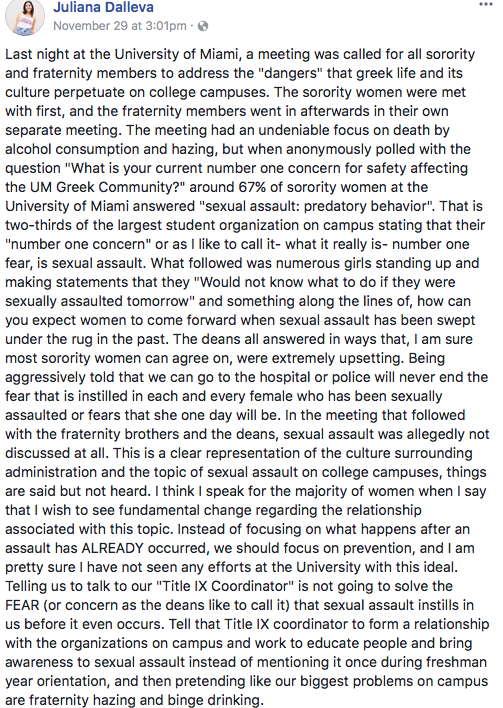UPDATED, Dec. 5, 2017: As the afternoon of Dec. 5, the total number of shirts ordered is estimated to be around 215. Xilas said many people have ordered multiple quantities of shirts in one order so the number is an approximation.
For Mangold, bringing the initial idea of the K(no)w More to fruition is to let both the university and each other, as women, know that sexual assault support and education is needed. Mangold said she wants administrators to take note that though the university has resources for sexual assault survivors, the majority of women on campus don’t know what they are.
“We are living in a pivotal moment when the tide seems to be shifting; women are speaking out and some abusers are being publicly held accountable…There is likely no other time in our lives where we will have so many different avenues for support, and potentially, action. However, after talking with students, the majority of students do not know the campus resources. If they were sexually assaulted tomorrow, they wouldn’t know what to do,” Mangold said.
Mangold and Xilas aren’t the only ones expressing their concerns following the mandatory Greek life meeting’s survey results. Sophomore Juliana Dalleva wrote a lengthy Facebook post the following day on Nov. 29. In the post, Dalleva called the way the university’s deans in attendance answered questions about sexual assault that arose during the meeting “upsetting.”
“Being aggressively told that we can go to the hospital or police will never end the fear that is instilled in each and every female who has been sexually assaulted or fears that one day she will be,” Dalleva’s post read. “…Instead of focusing on what happens after an assault has ALREADY occurred, we should focus on prevention…”
The post went viral among UM students garnering 199 likes and being shared 22 times.
Dalleva said she decided to make the post public to reach students at UM as well as other schools. Dalleva called sexual assault concerns an issue for Greeks and schools not only locally but nationally. Even so, she said even she was surprised by the reaction the post obtained.
“I was extremely surprised by the reaction because the amount of support I received was massive which only tells me that I am not the only person that feels this way,” said Dalleva, a business law philosophy and sociology double major.
This post is being updated as the story develops.
Vice President for Student Affairs Patricia Whitely called a mandatory meeting for all members of Greek life. Several deans, including Steven Priepke, who oversees fraternities, and Dean of Students Ryan Holmes, who started at UM over the summer, were in attendance. And the ballrooms of the Shalala Student Center were filled with about 1,500 members of the Greek community throughout the night.
A week prior to the meeting, The Miami Hurricane published an editorial calling for fraternities to be held accountable for a toxic culture of hazing and overt danger to human life. The editorial received widespread response from Greek and non-Greek students, as well as faculty and staff.
The event was called a “candid conversation” on Greek life. Attendees were separated by gender – sorority members met first, and fraternities met after the sorority discussion ended. Whitely said she hoped it would create a “comfortable climate for positive discussion.”
But after the deans took an informal, anonymous cellphone poll asking the women to select their “number one concern for safety affecting the UM Greek community,” the conversation became a heated back-and-forth.
It became immediately clear that the safety concern receiving the largest share of votes was sexual assault. The poll was intended to lead discussion, and was not a representative sample. Due to technical issues, only approximately 75 women of the 800 in the room were able to respond Whitely said. Sorority members have widely circulated that 67 percent of poll respondents answered that sexual assault was the largest concern.
But the poll did what it was intended to do: spark conversation.
“I think it’s a telling statistic,” President of the Panhellenic Association Emily Bajalia said, despite understanding the polling limitations.
In response to the results, attendees said the administrators encouraged them to report the incidents in order to see a change being made. This caused an eruption of comments from the students. One woman stood up and called on administrators to stop sweeping allegations “under the rug” and expecting women to come forward and then mishandling their cases. Another complained that she did not know where to go to report an incident, and the university did not make a significant effort to educate students of the available resources.
“The fraternities identified concerns around the consumption of alcohol and the responsible hosting of social events as their primary concern,” Priepke said during the men’s meeting. Several fraternity brothers reported hazing as the top concern on the safety poll. While sexual misconduct dominated the discussion in the women’s meeting, it was not addressed at length with the fraternities.
The conversation continued even after the initial mandatory meetings ended. The regular Panhellenic Association meeting was scheduled for after the “candid conversation,” and the executive board decided to start the meeting with an open forum for sisters who wanted to voice further concerns. More than 50 women of about 250 members present came forward to speak, Bajalia said.
Because of the reaction during the Greek conversation, the Dean of Students Office has reached out to all sorority chapters to provide sisters with information on resources available to them. They aim to have met with every sorority by Jan. 31, 2018 Bajalia said.
The women also decided to create their own campaign to raise awareness. Students Evelyn Mangold and Maddie Xilas hosted a brainstorming session in the days following the Greek meeting to come up with a slogan that would describe the outrage they feel about the prevalence of sexual assault and to demand the university do more to support and educate the community.
Mangold had the idea to create T-shirts to be worn en masse on a certain day.
“It isn’t appropriate to expect all these girls to speak out so I thought it would make a statement without forcing anyone to be uncomfortable,” she said in a Facebook message.
This brainstorming meeting, on a Wednesday night in the University Center, turned into K(no)w More.
Mangold and Xilas created T-shirts and tank tops with the slogan and are selling them to the campus community. T-shirts are $10 and tank tops are $12; the price includes the cost of the shirt and a donation to Lotus House, a local women’s and children’s shelter. The pair also created a Facebook event and are urging supporters to wear the shirts on Dec. 13.
By Dec. 4, 144 orders had been placed by members of all different sororities, fraternities and non-Greek organizations, including at least one member of the President’s Coalition on Sexual Violence Prevention and Education.
Title IX Investigator Maria Sevilla and Assistant Dean of Students and Director of Greek Life Cristina Luna will be holding two sessions to allow attendees to continue to voice their concerns over sexual misconduct and response. These meetings are open to everyone involved in Greek or not, and will be held from 8 to 10 p.m. Dec. 5, 10 a.m. to 12 p.m. Dec.8 in Merrick Panhellenic Building Suite 108.
Image courtesy Pixabay user cheskapoon.







